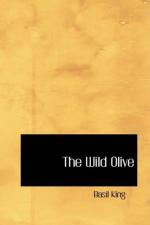It was already some months since those words had been spoken, so that he had ceased to dwell on them; but at first they haunted him like a snatch of an air that passes through the mental hearing, and yet eludes the attempt to bring it to the lips. Even if he had had the synthetic imagination that easily puts two and two together, he had not the leisure, in the excitement of his removal to Rosario and the undertaking of his duties there, to follow up a set of clews that were scarcely more palpable than odors. Nevertheless the words came back to him from time to time, and always with the same odd suggestion of a meaning special—perhaps fatal—to himself. They came back to him at this minute, as he stood watching the loading of the Walmer Castle and breathing the fresh air off the Parana. But if they threatened danger, it was a danger that disappeared the instant he turned and faced it—leaving nothing behind but the evanescent memory of a memory, such as will sometimes remain from a dream about a dream.
IX
Another year had passed before he learned what Miss Jarrott’s words were to mean to him. Knowledge came then as a flash of revelation in which he saw himself and his limitations clearly defined. His success at Rosario had been such that he had begun to think himself master of Fate; but Fate in half an hour laughingly showed herself mistress of him.
He had been called to Buenos Aires on an errand of piety and affection—to bury Monsieur Durand. The poor old unfrocked priest had been gathered to his rest, taking his secret with him—penitent, reconciled to the Church, and fortified with the Last Sacraments. Strange slipped a crucifix between the wax-like fingers, and followed—the only mourner—to the Recoleta Cemetery.
Having ordered a cross to mark the grave, he remained in town a day or two longer to attend to a small matter which for some time past he had at heart and on his conscience. It was now three or four years since he had set aside the sum lent him by the girl for whom he had still no other name than that of the Wild Olive. He had invested it, and reinvested it, till it had become a fund of some importance. Putting it now into the safest American securities, he placed them in the hands of a firm of English solicitors in Buenos Aires, with directions not only to invest the interest from time to time, but—in the event of his death—to follow certain sealed instructions with which also he intrusted them. From the few hints he was able to give them in this way he had little doubt but that her identity could be discovered, and the loan returned.




